
The US dollar is searching for direction on Thursday after the number of Americans filing for first-time unemployment benefits fell to a fresh pandemic low. But the latest numbers indicate that jobless claims are sliding at a sluggish pace as hiring slows down. With Washington in a stalemate over stimulus funding, it might be hard to forecast the greenbackâs performance in the short-term amid political uncertainty.
According to the Department of Labor, initial jobless claims came in at 840,000 in the week ending October 3. This is the lowest figure since the coronavirus pandemic started in March. The market had forecast a reading of 820,000. Continuing jobless claims hit 10.976 million, and the four-week average, which eliminates week-to-week volatility, fell to 857,000.
Last week, initial jobless claims totaled 849,000. The four-week average topped 870,000, and continuing jobless claims were just short of 12 million.
New jobless claims were led by Florida, Illinois, and Virginia. They fell the most in New Jersey and Pennsylvania. Once again, the number of new claims in California was not updated, meaning that it is at the same level as it was on September 19. The Golden State is facing an enormous backlog in applications and it is installing fraud-detection measures, forcing California to stop accepting new claims for two weeks.
Meanwhile, 464,437 people submitted claims under the Pandemic Unemployment Assistance Act, a federal law that temporarily allows self-employed workers to apply for benefits. This put the number of actual or unadjusted new claims at 1.3 million, which is also a pandemic low.
Overall, when you factor in federal and state programs, the number of people receiving benefits declined by one million to 25.5 million in the week ending September 19.
On Thursday, President Donald Trump spoke with the Fox Business Network and announced that stimulus negotiations are back on, despite shutting them down two days earlier. When Trump tweeted that he urged his aides to end talks, financial markets cratered, but they did erase most of those losses on Wednesday.
He told the business news network:
I shut down talks two days ago because they werenât working out. Now they are starting to work out. Weâre starting to have some very productive talks.
I said look weâre not getting anywhere: Shut it down. I didnât want to waste time. But in any event, we got back â both sides very capable â we got back, we started talking again. And weâre talking about airlines and weâre talking about a bigger deal than airlines. Weâre talking about a deal with $1,200 per person, weâre talking about other thing.
The president has signaled that he is willing to sign a bill that sends $1,200 checks to Americans. The divide between Republicans and Democrats is about $600 billion, with the GOP willing to endorse a $1.6 trillion bill and the Democrats wanting to spend $2.2 trillion.
The Federal Reserve stated this week that the Congress needs to approve fiscal stimulus measures to shore up the US economic recovery. Financial markets were rising on optimism over COVID-19-related stimulus.
The greenback posted modest gains on Thursday. The US Dollar Index, which measures the greenback against a basket of currencies, rose 0.09% to 93.72, from an opening of 93.61. The index is on track for a weekly gain of about 0.1%. Year-to-date, it is still down nearly 3%.
The USD/CAD currency pair tumbled 0.16% to 1.3237, from an opening of 1.3271, at 13:34 GMT on Thursday. The EUR/USD slipped 0.1% to 1.1755, from an opening of 1.1764.
If you have any questions, comments, or opinions regarding the US Dollar, feel free to post them using the commentary form below.